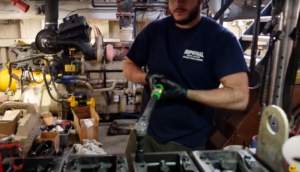February 11, 2025
The Role of the Camshaft in Engine Performance Camshaft Design in the Cummins KTA19 How the Camshaft Controls Timing and Fuel Injection Camshaft and Injection Timing Valve Timing Basics Symptoms of Camshaft Wear 1. Loss of Power 2. Rough Idling and Misfires 3. Unusual Noises 4. Increased Fuel Consumption 5. Smoke from Exhaust Rocker Arm and Push Rod Maintenance Signs of Rocker Arm or Push Rod Issues Routine Maintenance Identifying Bent or Damaged Push Rods Adjusting Valve Clearances for Optimal Performance Why Valve Lash Adjustment is Critical Valve Adjustment Procedure Cam Follower and Timing Gear Inspection Common Wear Issues Signs of Wear in the Timing Mechanism Symptoms of Timing Gear Wear Aligning Timing Marks Correctly During Rebuild Procedure for Proper Alignment Common Valve Train and Camshaft Issues Common Issues and Solutions Conclusion Key Takeaways Disclaimer Read More
December 31, 2024
Why Valve Adjustments Are Important Tools and Preparation Step 1: Preparing for the Adjustment Positioning the Crankshaft Step 2: Measuring Valve Clearance Step 3: Adjusting Valve Clearance Setting the Correct Clearance Repeat for All Valves Step 4: Post-Adjustment Verification Final Steps Reassemble the Engine Maintenance Tips and Best Practices Troubleshooting Common Issues Problem: Tapping or Knocking Noises Problem: Loss of Power Problem: Excessive Smoke Read More
December 31, 2024
Why Injector and Valve Adjustments Are Critical For Detroit Diesel 53 Series Engines (3-53, 4-53, 6V53, 8V53) Required Tools and Equipment Preparatory Steps Injector Timing Adjustment Procedure For Detroit Diesel 53 Series Engines (3-53, 4-53, 6V53, 8V53) Valve Adjustment Procedure For Detroit Diesel 53 Series Engines (3-53, 4-53, 6V53 & 8V53) Step 1: Inspect Valve Components Step 2: Measure Valve Clearance Step 3: Adjust Valve Clearance Step 4: Verify the Adjustment Follow the Firing Order Post-Adjustment Verification For Detroit Diesel 53 Series Engines (3-53, 4-53, 6V53, 8V53) Additional Considerations Common Issues and Troubleshooting Best Practices and Maintenance Tips Troubleshooting Common Problems Symptom: Loss of Power Symptom: Excessive Noise Symptom: Poor Fuel Efficiency Conclusion Read More
December 31, 2024
Starting and Stopping Procedures: Tips for Extending Engine Life In Detroit Diesel 53 Series Engines (3-53, 4-53, 6V53, 8V53) Proper Starting Procedures Pre-Start Inspection: Cold Start Tips: Normal Start Procedure: Proper Stopping Procedures Cooling Down the Engine: Avoid Immediate Shutoff Under Load: After Shutdown: Injector and Valve Adjustments: Regular Tune-Ups to Maintain Engine Power and Efficiency For Detroit Diesel 53 Series Engines (3-53, 4-53, 6V53, & 8V53) Injector Adjustment Purpose of Injector Adjustment: Tools Required: Adjustment Procedure: Final Steps: Valve Adjustment Importance of Valve Adjustment: Tools Required: Adjustment Procedure Sequence and Final Checks Timing Adjustments: Ensuring Precise Combustion for Fuel Economy and Performance Understanding Timing in Detroit Diesel 53 Series Engines Fuel Injection Timing Adjustment Tools Required: Adjustment Procedure: Reassemble and Test: Valve Timing Adjustment Importance of Regular Tune-Ups Troubleshooting Common Issues Best Practices for Operation and Tune-Up Read More
December 9, 2024
Guidelines for Disassembly, Cleaning, and Inspection For 92 Series Engines (6V92 , 8V92, 12V92, 16V92) 1. Preparation for Disassembly Clean the Exterior Gather Necessary Tools and Documentation 1. Use Detroit Diesel-Approved Tools 2. Substitute the Manual with Verified Specifications 3. Supplementary Resources 4. Final Tips for Preparation Drain Fluids 3. Disassembly Process 3. Cleaning and Inspection Replacement of Key Components: Pistons, Liners, Bearings 1. Pistons 2. Cylinder Liners 3. Bearings Overhaul Kits For Detroit Diesel 92 Series Reassembly Tips Follow Manufacturer Specifications Cylinder Head Bolts Main Bearing Cap Bolts Connecting Rod Bolts Injector Hold-Down Bolts Exhaust Manifold Bolts Flywheel Bolts Thermostat Housing Bolts Valve Clearance (Cold) Injector Timing Plunger Travel Piston-to-Cylinder Wall Clearance Main Bearing Clearance Connecting Rod Bearing Clearance Step-by-Step Assembly Sequence Lubricate Moving Parts Test Fit Components Conclusion Read More
December 6, 2024
1. General Adjustment Procedures 1. Ensure the Engine is at Normal Operating Temperature 2. Disconnect Battery Connections 3. Gather Required Tools 4. Position the Engine at the Correct TDC 2. Exhaust Valve Clearance Adjustment Step 1: Locate TDC for Adjustment Step 2: Loosen the Lock Nut Step 3: Insert the Feeler Gauge Step 4: Adjust the Clearance Step 5: Tighten the Lock Nut Step 6: Verify the Clearance Additional Tips: 3. Fuel Injector Timing Adjustment Step 1: Set the Engine at TDC Step 2: Position the Injector Rack Step 3: Adjust the Timing Plunger Step 4: Lock the Adjustment Step 5: Test Injector Operation Additional Tips for Fuel Injector Timing Importance of Accurate Timing 4. Best Practices for Adjustments Double-Check Measurements Inspect for Wear Tighten Fasteners to Torque Specifications 5. Maintenance Intervals 6. Additional Tips from the Detroit Diesel 92 Series Manual 1. Use Genuine Specifications 2. Monitor Engine Performance 3. Keep Records Clarifications and Notes 7. Conclusion Read More
Page 1 of 9 1 2 3 4 5 ... » Last »




 Free US Calls: 1-888-433-4735
Free US Calls: 1-888-433-4735 International: 305-545-5588
International: 305-545-5588


